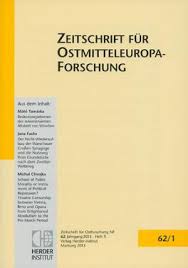Die Rezeption des Švejk in der Ersten Tschechoslowakischen Republik. Eine Neubewertung und systematische Einordnung
The Reception of Švejk in the First Czechoslovakian Republic. A Reevaluation and Systematic Classification
Author(s): Sebastian PaulSubject(s): Czech Literature, Pre-WW I & WW I (1900 -1919), Interwar Period (1920 - 1939), Theory of Literature
Published by: Verlag Herder-Institut
Keywords: Reception of Švejk; First Czechoslovakian Republic; Reevaluation; Systematic Classification;
Summary/Abstract: Jaroslav Hašek’s The Good Soldier Švejk could be called the most famous Czech novel of the 20th century. It tells the story of a Czech soldier during the First World War. He carries out with devotion all kind of commands he receives from the military authorities; but in doing so he constantly causes problems in absurd situations. It remains unclear if the main character gets into all this trouble due to mere stupidity or if his behaviour is a form of passive resistance. Between 1921 and 1923, when the first editions of the novel were published, literary criticism did not pay much attention to it. This general observation is not tied to a specific political or ideological camp. The positive reviews by Ivan Olbracht and Max Brod were two of only a few reviews to appear until 1925. Only then did Švejk become the subject to a debate about the ideal image of a Czechoslovak soldier. The actors in this discourse were soldiers and Czechoslovak legionaries who claimed to have played a significant role in the founding of the state. They felt offended by articles that declared the Švejk character to be a typical Czech soldier during the First World War. When the German translation of the novel came out in 1926, Hašek’s novel became surprisingly popular abroad. Because of this unexpected success, Czechoslovak literary criticism also started to examine the Švejk character, debating its role as an archetype of a Czech soldier. A new aspect to this debate was added in the discussion of whether the main character symbolized the typical behaviour of all Czechs during the First World War. These two aspects of the novel’s reception led to a polemical article by the Catholic writer Jaroslav Durych, who totally condemned it. Furthermore it resulted in a controversy between the nationalist Viktor Dyk and the communist Julius Fučík about whether the “Švejk behaviour” is dangerous or advantageous for the Czechoslovak state and its population. In 1928, on the 10th anniversary of the founding of Czechoslovakia, these controversies reached a climax in the play Plukovník Švec, written by the former legionary Rudolf Medek. He tried to contrast Švejk with his main character, who was seen in nationalist and military circles as an honourable Czech World War One hero. Communist writers saw Švejk as a typical representative of the working class and they declared him a pioneer in the fight for a world revolution. Broad sections of the interwar Czechoslovak public dealt with Hašek’s Švejk in different ways. In the second half of the 1920s after having gone unnoticed for several years, the novel and its main character became an instrument of ideological debates which even in the 1930s were far from complete.
Journal: Zeitschrift für Ostmitteleuropa-Forschung
- Issue Year: 63/2014
- Issue No: 2
- Page Range: 249-278
- Page Count: 30
- Language: German

